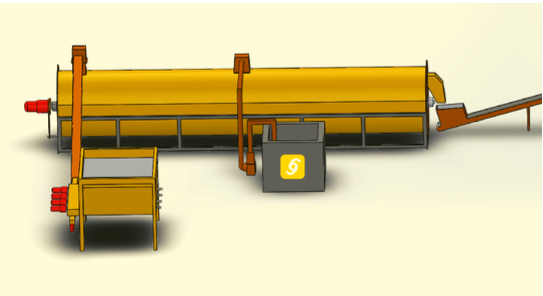Composter

The composter has been increasing its popularity in recent years. Because the composter accelerates the natural process called ‘composting’. In this way it quickly generates value from organic waste. The mentioned value is the production of a substance called ‘compost’ as soil conditioner. The general characteristics of compost are as follows:
- Increases the water holding capacity of the plant.
- Preserves the vitality of the soil.
- Creates an environment where beneficial microorganisms can live.
- Encourages the plant to take the food when it needs it.
- Reduces the need for chemical fertilizers.
- Acts as a shield against plant diseases.
People often confuse compost and organic fertilizer with each other. The following definition may clear up the confusion:
Compost feeds the soil, organic fertilizer feeds the plant. The effects of compost are longer-term, but it is also possible to increase the short-term effect by enriching the compost.
In addition to the benefits of compost, businesses that buy composter also:
- Gets rid of waste disposal and logistics costs.
- Takes action within the scope of zero waste legislation.
- Has the chance to make reports on sustainable development goals.
- Fulfills its responsibility towards society and the environment.
- Increases the sense of belonging within the institution.
- If the capacity is suitable, it will earn regular income.
When composter turn organic waste into compost?
In order to understand the compost formation period, the concept of composting and the resulting compost product should be examined scientifically. Finding answers to the following questions will play an active role in choosing the right composter:
- How many types of composters are there?
- What are the parameters that show that the composting process is working correctly?
- What are the quality parameters of compost?
Compost in 24 hours
Composters often fall victim to sloganic sales strategies. Discourses such as ‘compost in 1 week’, ‘compost in 24 hours’ create the first impression of machine performance in the minds of the buyer. In most cases, it is meaningless to talk about time without understanding the type of organic waste and which feature of the composter affects which parameter of the process.
Phytotoxicity
Phytotoxicity is one of the most important concepts in the evaluation of the resulting compost product. If the product is not put through the right composting process and has a phytotoxic effect, it will bring more harm than good when used. Especially enterprises often encounter this problem when they skip curing step.
You can find the effect of Genema composters on composting parameters at the link: Key parameters of composting systems
You can also find a comprehensive explanation of the concept of phytotoxicity at the link: Detection of Phytotoxicity

